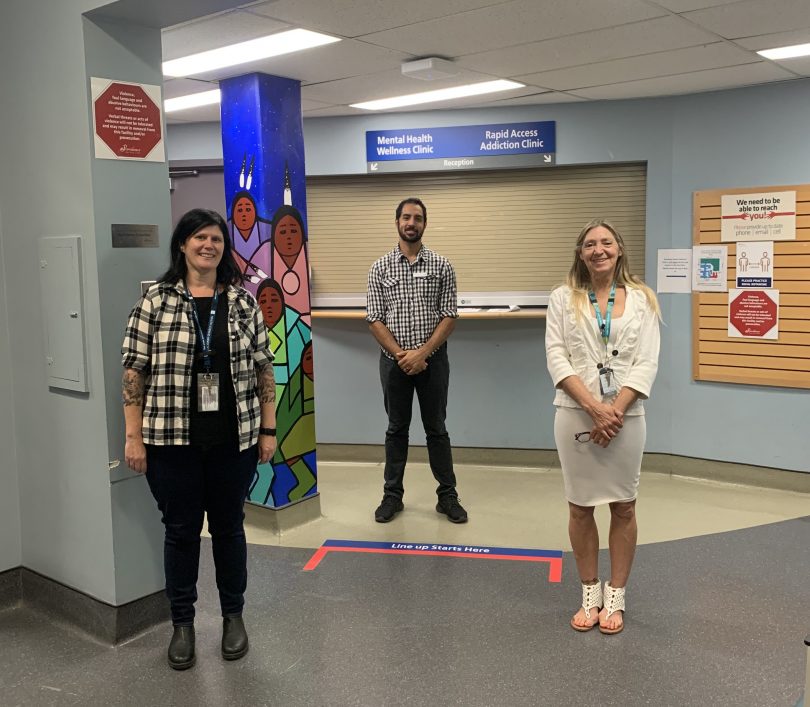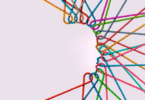The one thing Karen Scott misses the most is giving hugs. The peer navigator at St. Paul’s Rapid Access Addiction Clinic (RAAC) helps some of the city’s most vulnerable people. She has lived through decades of chronic substance use so she knows exactly how they feel. But now she’s living, and working, through COVID-19, in addition to the opioid crisis. That means protective gear, and no more hugs. “I can share my heart, but I want them to be able to see my face and expressions. I want them to know ‘Hey, it’s OK. I’ve been there.’ Sometimes all they need is a hug.”
Just like every other health care service, the team at the RAAC has had to adapt to the pandemic quickly. In mid-March, the clinic was given just one day to move locations from inside St. Paul’s Hospital to the HUB space in the back courtyard so clients could still access the essential services.
Sam Gill, the clinical nurse leader, remembers the chaos, “A lot of quick decisions were made and it took time to settle into the new space. We also needed to do extra training for staff, and let everyone know about the location change. Our team stepped it up big time and made the best of the situation.”

The RAAC opened its doors at the height of the opioid crisis
Since opening its doors in September 2016, the RAAC staff have hit the ground running. The opioid crisis had been declared a public health emergency earlier that year. The number of overdose deaths kept climbing. The clinic’s model of low barrier patient-focused care was immediately successful. Those seeking help for substance use disorder are usually able to access services within a day, no appointment or referral necessary.
The numbers of overdose deaths were finally starting to go down last year, but the pandemic has clawed that progress back. B.C. just marked the third straight month with more than 170 overdose deaths, breaking the previous record.
COVID-19’s devastating impact on overdose deaths
Social worker Jenn Breau doesn’t mince her words, “We can’t help people who are dead. It’s a day to day war zone with the poisoned supply. We have safe supply options and they must be scaled up.” She says while she and her colleagues have now figured out how to work with COVID-19, its impact has also become devastatingly clear.
Social distancing measures shut down many of the treatment programs and support groups. While the RAAC remained open, using virtual health whenever possible, fewer people came to seek help.
“Our clients don’t always have the technology to support virtual care so it was definitely more challenging for them to access care,” explains Gill.
He adds, “Some people were also apprehensive about coming in to the hospital, so out team had to find new ways to deliver care with some of the safe supply exemptions passed by the Ministry of Health. A lot changed quickly and we tried to adjust quickly, but admittedly, there were times when things took longer and did not run as they did pre-COVID-19.”

RAAC offers hope
But Breau believes there is still hope. As an example, she shares the recent story of a client who has been working with the RAAC team for quite a while. After years of dealing with addiction, he got to the point where he was able to participate in an Indigenous healing ceremony in the remote wilderness, which included living in the bush for six weeks. He still stays in contact with the clinic.
“Even if people feel stuck, I think RAAC offers them that place of hope. Change is always possible, with support. We aren’t meant to do things by ourselves,” says Breau. “We are meant to have a community around us. RAAC can be that first piece of community.”

Karen Scott also remains hopeful. She recommends anyone who is using alone to download the new Lifeguard app. The B.C.-based app connects people to emergency responders if they are unresponsive. And Scott is well aware how quickly a deadly overdose can happen. Her last time using was crystal meth, which turned out to be laced with fentanyl.
“There is not a drug out there that I have not done. I’m not proud of that, but it makes me who I am today. It makes me more relatable to people.”
Patients are now coming back to the RAAC. The last few weeks have seen record numbers, and that’s exactly that the team wants to see. “We are here for you! There is no judgement,” emphasizes Scott. Though the peer navigator can’t give out hugs right now, she laughs and says she tells her clients, “‘If it wasn’t for this COVID, I’d give you a hug right now.’ It makes them smile.”
August 31 marks International Overdose Awareness Day. This annual global event held aims to raise awareness of overdose and reduce the stigma of a drug-related death. It also acknowledges the grief felt by families and friends remembering those who have died or had a permanent injury as a result of drug overdose. International Overdose Awareness Day spreads the message that overdose death is preventable.





